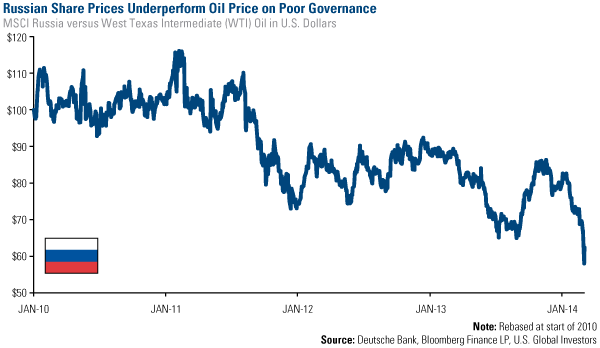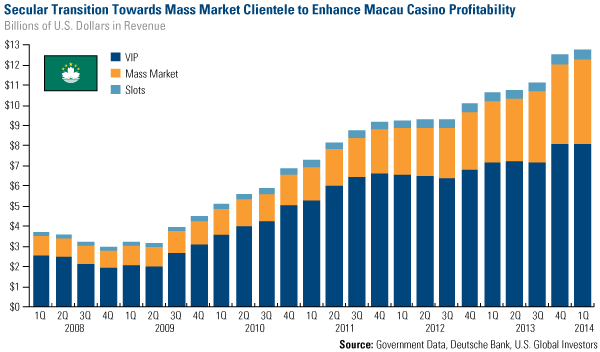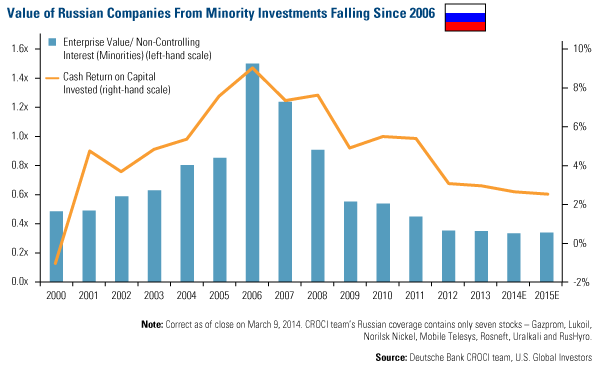Emerging Markets Radar (April 21, 2014)
Strengths
- In Indonesia, despite lower-than-expected election results for leading presidential candidate Joko Widodo’s party, the Indonesian stock market managed to stabilize this week along with the rupiah. Investors remain hopeful that a coalition government led by Joko Widodo will help reform the country’s economic policies for the better.
- The Turkish equity market has been one of the best performing markets globally, up 10 percent year-to-date. The market is supported by a stabilized lira after interest rate increases last year and municipal elections in March reaffirmed the popularity of the current government.
- Greece, which was unable to borrow for the last four years, recently raised 3 billion euros by selling a five-year bond with a 4.75 percent coupon. International investors accounted for almost 90 percent of the offering. Greece has also been re-categorized as an emerging market since last November.
Weaknesses
- Brazil's consumer price index (CPI) grew last month, marking the biggest increase in inflation during March in eleven years. The price increase calls into question the effectiveness of the central bank's efforts to control inflation, and could potentially create problems for President Dilma Rousseff's reelection campaign.
- China’s March industrial production and first-quarter fixed asset investment growth came in weaker than expected at 8.8 percent and 17.6 percent, respectively. This reflects weaker activity in exports and the property sector, as well as slower credit expansion. The 7.4 percent GDP growth in the first quarter, albeit slightly better than the estimated 7.3 percent, marked the slowest pace since September 2012.
- The impact of poor governance, along with rent seeking by the state and controlling shareholders, has led to the underperformance of Russian share prices versus the oil price since the start of 2010.
Opportunities
- The labor market data released in Poland this week was a positive surprise. Wages were expected to correct by 4 percent versus the previous month’s strong reading, yet the figure shot up to 4.8 percent year-over-year. If the wage growth stays close to 5 percent (with inflation closer to zero), it could mean solid support for domestic demand.
- Alibaba Group Holding will file papers next week for its initial public offering (IPO) in the U.S. The offering of the Chinese Internet retailer could be worth more than $16 billion, making it the biggest technology IPO.
- Recent share price correction in Macau-based casino operators may prove a temporary setback for an otherwise multi-year growth uptrend. Secular industry transition remains intact towards a more profitable mass-market customer base from the high-rolling VIP clientele. China’s recent announcement of the Hong Kong, Shanghai mutual market access program may invite more interest from mainland Chinese investors who currently cannot participate in Macau stocks.
Threats
- The International Monetary Fund (IMF) has scaled back its forecast for world economic growth to 3.6 percent from January’s 3.7 percent. A cooling off of emerging-market expansion along with weakness in Japan has become a drag on global growth, warned the IMF.
- Volatility in Hong Kong-traded Chinese equities may increase going forward because of the overhang associated with potentially rising debt defaults and maturity schedules for wealth-management products peaking in the second half of the year. Additionally, there are no consistent government policy solutions in sight.
- MSCI made an announcement this week regarding whether or not the current classification of Russia as an emerging market is still appropriate. According to one Deutsche Bank strategist, Russia may appear to be a mainstream emerging market in terms of GDP per capita and quantifiable liquidity, but this classification ignores real drivers of risk, namely sovereign and corporate governance.
















